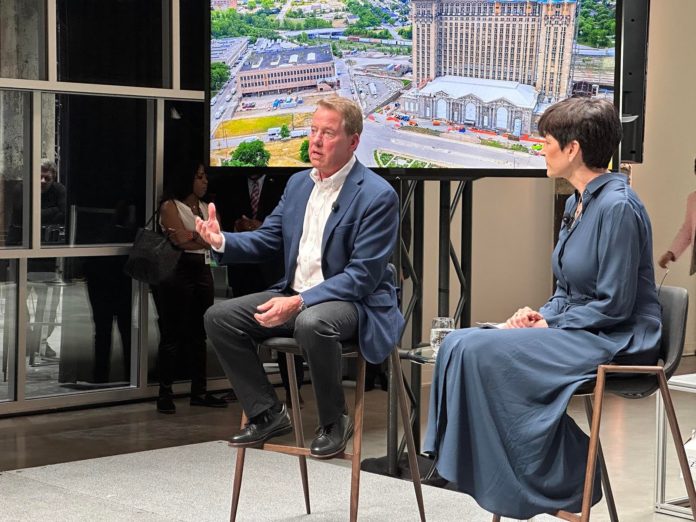The noise of construction briefly gave way to the sounds of celebration Monday evening as Ford Motor Co. marked the official launch of Michigan Central, a billion-dollar project which, declared Chairman Bill Ford Jr., is meant to deliver “breakthrough solutions at the intersection of mobility and society.”
Buzzwords and catchphrases aside, the sweeping program serves as a milestone for both Ford and the City of Detroit. In 2018, the automaker’s Chairman announced plans to establish a major presence in Corktown, the Motor City’s oldest extant neighborhood. It will serve, Ford explained, as ground zero in Ford’s transformation from a motor vehicle manufacturer into a broader mobility company. Among other things, it will house the company’s electric, autonomous and connected vehicle operations.
The heart of the project is the old Michigan Central Station and its 18-story office tower — which, when first opened in January 1914 was the world’s tallest railroad station. Ironically, that was just a year after Henry Ford’s first moving assembly line went into operation just miles away.
Ruin porn
During the next three-quarters of a century passenger rail traffic dwindled to a trickle and the depot was shuttered in January 1988. In the subsequent decades it fell into serious disrepair, serving as an unwanted symbol of Detroit’s decay. Stripped of its once lavish furnishings, it served only as a shelter for the homeless and as a place for urban explorers aiming to capture “ruin porn” on film.

The renovation project has been a challenging one, Ford aiming to restore the station to its former glory. It won’t formally reopen until late this year or early 2024, according to company officials. But the broader project celebrated a critical milestone on Monday with the reopening of the adjacent Book Depository.
Designed by the legendary Albert Kahn, who was the lead architect for many Ford Motor Co. projects, the sprawling building initial served as a mail sorting center before being handed off to the Detroit school system which turned it into a class book depository. Like the train station, it had been abandoned for nearly four decades before the automaker stepped in.
The “future could be invented here”
It now will serve as the home of Newlab, a high-tech incubator, said Joshua Sirefman, who came on as CEO of the “Michigan Central Innovation District” in February 2022.
“The path to a more sustainable and equitable future could be invented here,” he told a standing-room-only crowd that gathered at the newly reopened Book Depository.

At the dedication 33 “startups, entrepreneurs, engineers and scientists” have signed up for space at Newlab. Some are focused on improving the automotive manufacturing process. And a number of tenants are focused on the transition to battery-electric vehicles.
Dunamis Charge is developing a new EV charging technology. It’s the first company of its kind started and owned by a black woman and has begun hiring urban residents who might not have had the opportunity to work in the emerging field before.
Newlab, said CEO Natalie King, “is creating an intersection between mobility and technology.”
Raiding Silicon Valley
Still others joining Newlab are taking aim at the aftermarket. Robotire is developing an automated mounting system for tire shops, explained Fin Elliott, the startup’s head of product.
Notably, Robotire was original based in Silicon Valley, the most well-known innovation hub in the country, But Elliott said he and his partners “found it very difficult to start a company in California. In Michigan,” they found, “there are a lot more resources.”

Fully half of those who will now call the old Book Depository home have come from outside Michigan, said Sirefman, one migrating over from Norway.
Significantly, those who set up shop at Newlab are being permitted — indeed, encouraged — to reach out to Ford’s competitors. To demonstrate its new tire mounting system, Robotire used a Chevrolet Equinox, rather than a Ford vehicle. And one of the startups has already been working with an Asian automaker, said Sirefman, though he declined to name which one.
“This is an open platform. We encourage (Newlab members) to seek out” business, wherever it might come, said Sirefman.
Drones and the energy of connections
While there is a clear emphasis on auto-related ventures, Newlab has space for those exploring other forms of mobility.
“We deal with traffic management of drones,” explained Daniel Bradshaw, the chief technology officer of Airspace Link.

Asked why his company would want to set up operations at Newlab, Bradshaw pointed to “the energy here, the connections. You walk down the hall and meet people and it can have a direct impact” on future business.
They thought he “was out of my mind”
Work on the old Book Depository is far from complete. Many of the walls still need to be patched and painted, for one thing. But it’s come a long way from when Ford first acquired it. “There were literally trees growing in here,” Chairman Bill Ford recalled to reporters, adding that some of his staff thought “I was out of my mind.”
Initially, the automaker expected to spend $740 million to bring the Michigan Central project together. Today, the price tag has grown to around $1 billion. It’s also expanded in size and scope — with the ultimate campus expected to cover about 30 acres.
It’s a unique opportunity that “couldn’t happen anywhere else,” the Ford family heir stressed during a Q&A session. One reason is the cooperation the automaker is getting from both the city and the state. A section of adjacent roadway, for example, is being dug up and replaced with a prototype system that eventually could permit battery-electric vehicles to charge while driving.
Together, Newlab and the rest of the Michigan Central Project are coming along at a time of critical transformation, proclaimed the great-grandson of Ford Motor Co.’s founder Henry Ford. “It’s all about creating the future.”

